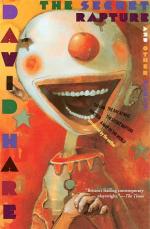|
This section contains 2,532 words (approx. 7 pages at 400 words per page) |

|
Glenn has a Ph.D. and specializes in theatre history and literature. In this essay, Glenn explores David Hare's play through Aristotle's classical theory of tragedy found in the Poetics and Arthur Miller's modern vision described in the essay "Tragedy and the Common Man."
When David Hare's The Secret Rapture opened at the Royal National Theatre in London in October 1988, critics attempted to categorize the play as something familiar. Some pointed to the exaggerated portrayals of the ambitious, self-interested politician, Marion, and her almost clownishly religious businessman husband, Tom, and called the play political satire, or a contemporary comedy of manners. Others recognized the play's deeply rooted Christian symbolism and termed it a philosophical drama about contemporary life in Britain. Writing for the Sunday Times, John Peter remarked, "The Secret Rapture is a family play; it is also the first major play to judge the England of...
|
This section contains 2,532 words (approx. 7 pages at 400 words per page) |

|




